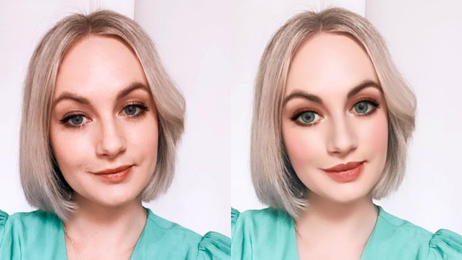Updated Mar 24, 2023

Technology reporter Cristina Criddle edited this photo on a free app in under 10 minutes to illustrate extreme editing.
During my journey of teaching new and small business owners how to navigate the traditional and digital world of small business marketing, I began to understand the concern for our youth’s increased screen time due to the pandemic.
The “selfie culture” and the never-ending quest for perfection has triggered an alarming decrease in mental health. Following are two articles that dive deeper into this exploding culture.
The first article titled, “Be honest, how much do you edit YOUR selfies?” suggests the most common photo alterations are smoother skin, enhanced eyes and thinner noses.
Author Moya Lothian-McLean explains that online influencers and celebrities that present these impossibly beautiful images can trigger young women to feel worse about their own body images. Many girls who posted altered pictures of themselves began wanting to look like their edited version, which is one of the reasons cosmetic surgery has skyrocketed.
The second article, "Girl Guides: Enhanced photos need labels on social media," by Cristina Criddle, explains the need to disclose the photos that are digitally altered. The UK Girl Guiding Advocate panel, whose members are aged 14 to 25, is in agreement that influencers and advertisers should be forced to declare digitally altered photos on social media.
Dr. Luke Evans MP, a Tory member of the Health and Social Care Committee and a General Physician, was inspired to introduce the bill after seeing first-hand the effects of these images on people's mental health.
A proposed law would force social media users and advertisers to label images where bodies or faces have been edited. Although enforcement would be virtually impossible, corporate culture is changing as Getty Images, the stock images agency, has banned retouched images from its commercial category.
This is a complex problem that doesn’t have a simple solution, but there are things we can do. Below are 3 points to keep in mind:
Keeping up with our rapidly changing online world is an investment into our youth and the future of society as a whole.
Subtotal 0